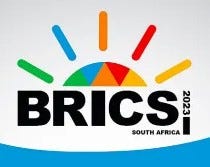
The Fifteenth Summit of BRICS was held in Johannesburg, South Africa, from August 22 to August 24, 2023. The five nations of BRICS were represented by Cyril Ramaphosa, President of South Africa; Xi Jinping, President of China; Narendra Modi, Prime Minister of India; Luiz Inácio Lula da Silva, President of Brazil; and Serguéi Lavrov, Minister of Foreign Relations of Russia in representation of Russian President Vladímir Putin, who participated via videoconference.
On August 24, the leaders of the five nations of BRICS held a press conference, in which they presented the Final Declaration and provided a review of the event. The most spectacular announcement, although expected, was that BRICS would include six new member states, beginning January 1, 2024. The new member nations are Saudi Arabia…


